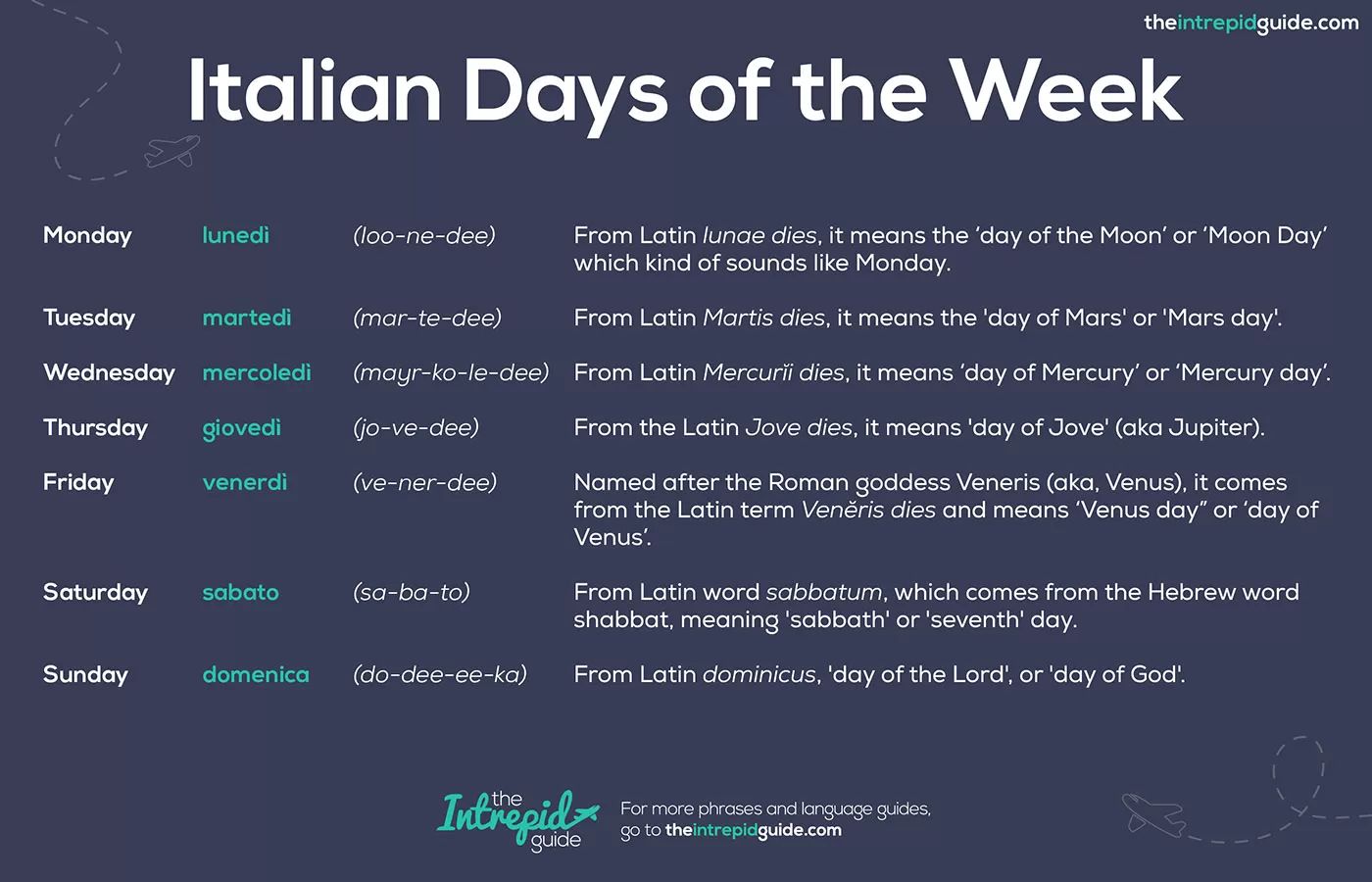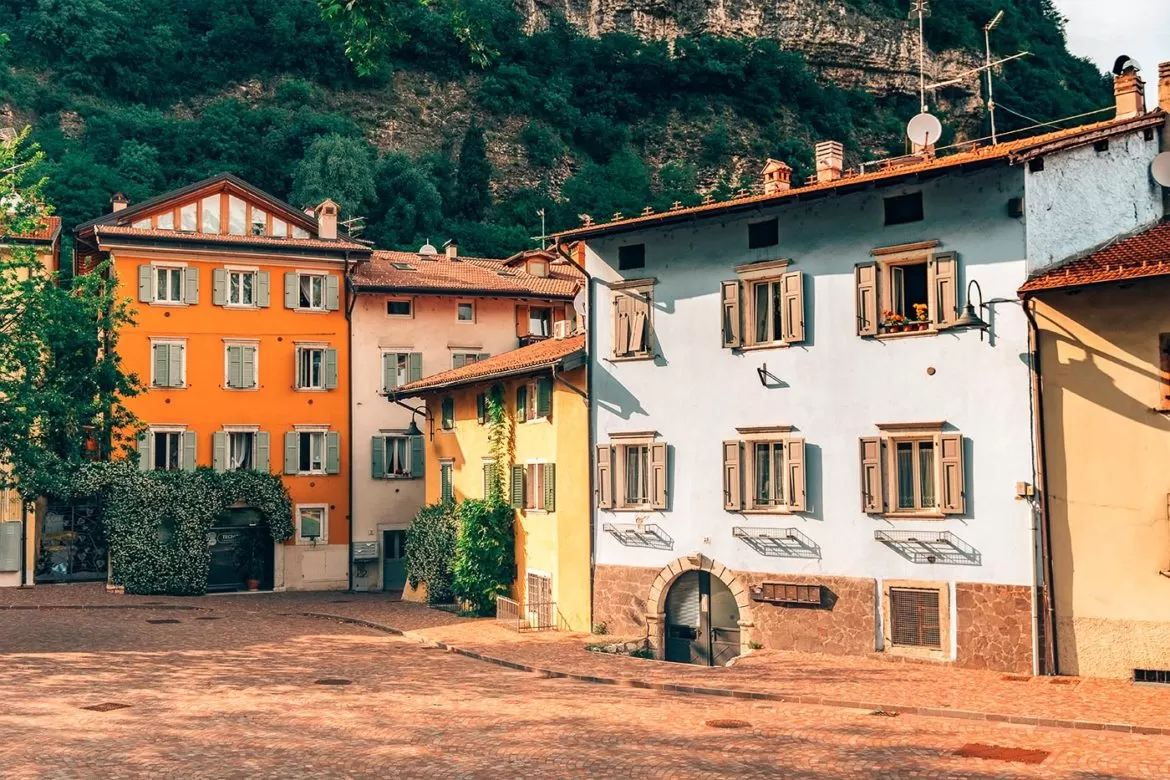Learn the days of the week with this complete guide! Includes audio snippets so you can nail your Italian pronunciation and sound like a native.
Once you’ve learned your Italian numbersand the most common Italian words, the next step is to master how to say the days of the week in Italian. Semplice! (Simple!). Since days in Italian don’t resemble their English counterparts, I’ve included some fun facts that will act as memory hooks to help you remember them.
What’s a memory hook? A memory hook is where you map (or connect) something new with something you already know. This way, you think of the ‘hook’ and work backwards to reach the newly learned material. Memory hooks are the foundation of all my language courses because they are so effective and powerful.
For example, the subject pronoun he in Italian is lui (loo-ee), and she is lei (lay), so your memory hook could be King Louis and Princess Leila. It’s that simple!
Here are the days of the week in Italian, how to remember them, plus how to pronounce them! So, when someone asks you ‘Che giorno è oggi?’ (What day is it today?) you can reply correctly!
The first thing you’ll notice is that all weekdays in Italian end in dì, meaning day (giorno) from the Latin dies. The grave accent shows you where the stress falls in the word.
Interestingly, Italian days of the week come from the names of the planets! Something that is common to many languages. The Babylonians first started this trend, believing that celestial bodies controlled the first hour of each day. Then along came the Romans and adopted it into Latin. So, by learning the days in Italian, you’re actually killing two birds with one stone – you will learn the names of the planets too!
Days of the Week in Italian (Giorni della settimana in Italiano)
| English translation | Italian translation | Italian Pronunciation | Memory hack to help you remember |
|---|---|---|---|
| Monday | lunedì | loo-ne-dee | From Latin lunae dies, it means the ‘day of the Moon’ or ‘Moon Day’ which kind of sounds like Monday. |
| Tuesday | martedì | mar-te-dee | From Latin Martis dies, it means the ‘day of Mars’ or ‘Mars day’. |
| Wednesday | mercoledì | mayr-ko-le-dee | From Latin Mercurĭi dies, it means ‘day of Mercury’ or ‘Mercury day’. |
| Thursday | giovedì | jo-ve-dee | From the Latin Jove dies, it means ‘day of Jove’ (aka Jupiter). |
| Friday | venerdì | ve-ner-dee | Named after the Roman goddess Veneris (aka, Venus), it comes from the Latin term Venĕris dies and means ‘Venus day” or ‘day of Venus’. |
| Saturday | sabato | sa-ba-to | From Latin word sabbatum, which comes from the Hebrew word shabbat, meaning ‘sabbath’ or ‘seventh’ day. |
| Sunday | domenica | do-dee-ee-ka | From Latin dominicus, ‘day of the Lord’, or ‘day of God’. |
So, what happened to sabato (Saturday) and domenica (Sunday)? Why don’t they end in dì like the others do? And why aren’t they named after planets? As a matter of fact, they are! In English, Saturday is the day of Saturn (Saturno in Italian) and Sunday is the day of the Sun (Sole in Italian).
In the aftermath of Christianity spreading across the Western world, the pagan names for Saturday and Sunday were replaced by the Hebrew word Sabbath (meaning, day for resting) and the Latin Dominus dies (meaning, day of the Lord).
Italian days of the week: 4 Rules to follow
All days of the week in Italian are considered masculine, except for domenica, which is feminine.
1. Use articles for repeated actions
In general, we do not use an article with the days of the week, unless we are talking about an action that is repeated. Take a look at the difference in meaning in the examples below:
- Martedì vado al cinema. – On Tuesday I am going to the cinema.
- Il martedì vado al cinema. – On Tuesdays, I go to the cinema.
In the first example, we’re saying that I will go to the cinema this Friday. However, in the second example, the article il shows that this action is repeated and is a habit. In other words you’re saying, Usually, on Fridays, I go to the cinema.
Here’s another example:
- Domenica non posso andarci. – I can’t go there on Monday.
- La domenica non posso andarci. – I can’t go there on Mondays.
If we add the article il, it means I can’t go there on any given Monday.
2. Use articles to describe specific days
Another way in which you use the article is when we talk about or describe a specific day of the week. For example:
- Il venerdì è il mio giorno preferito. – Friday is my favourite day.
- Odio il mercoledì! – I hate Wednesdays!
Alternatively, when talking about recurring actions or habits with regard to certain days of the week you can use the preposition di. This has the same meaning as when using an article.
- Cosa fai di Sabato? – What do you do on Saturdays?
- Vado a pranzo dai miei genitori di domenica. – I go to my parents for lunch on Sundays.
3. Say tutti i…. instead of articles
Finally, if you want to say “every Monday, Tuesday, Wednesday and so on.”, you can use the sentence tutti i… Attenzione! (Be careful!) When using this, the word for the day does not change to the plural form, it stays the same. Again, the only exception is domenica (Sunday), which becomes domeniche (Sundays).
Here are some examples:
- Gioco a tennis tutti i lunedì. – I play tennis every Monday.
- Tutte le domeniche faccio la spesa. – Every Sunday I do the grocery shopping.
4. Write all days of the week in Italian in lowercase (except for Sunday)
Unlike English, when writing both days of the week and months of the year in Italian, the first letter doesn’t have a capital letter. This isn’t as strange as it sounds. Many languages follow this same rule such as French, Spanish, Portuguese, Romanian, Russian, Serbian, Dutch and Norwegian. This makes English the odd one out, along with Greek.
Bonus tip: While Italian technically has its own equivalent of the word weekend, which is ‘il fine settimana’, most Italians use the English word instead. The only difference is they pronounce it as if it were an Italian word so it sounds something like wee-ken-deh.
Sei sempre in mezzo come il giovedì
For Italians, the day in the middle of the week is Thursday, not Wednesday. In fact, there is even a fun Italian idiom to help you remember. ‘Sei sempre in mezzo come il giovedì’ literally means ‘You’re always in the middle like Thursday’. It can even be shortened to ‘Sei come il giovedì” (‘You’re like Thursday’).
Italian Adverbs of Time
Here is a list of more useful Italian vocabulary to know when talking about time.
| Italian word | English Translation | Italian word | English Translation |
|---|---|---|---|
| dopo, poi | after | piano, lentamente | slowly |
| ancora | still, yet, again | subito | immediately, right away, at once |
| sempre | always | allora, poi | then |
| ogni tanto | sometimes | presto | early |
| prima | before, first | oggi | today |
| domani | tomorrow | adesso, ora | now |
| mai | never | in fretta | in a hurry |
| di solito | usually | spesso | often |
| quando | when | ieri | yesterday |
| presto | quickly, soon | tardi | late |
| stamattina | this morning | mai | never |
| stasera | this evening | nel frattempo | in the meantime |
| oggigiorno | nowadays | appena | just, barely |
| finora | until now | domani | tomorrow |
| di nuovo | again | fa | ago |
| tra poco / fra poco | in a little while | ormai | by now |
| già | already | più | again |
| la settimana | week | il fine settimana / il weekend | weekend |
There you have it! Those are the days of the week in Italian plus some helpful facts and memory hooks to help you remember them. So, the next time someone asks you ‘Che giorno è oggi?’ (What day is it today?) You’ll know exactly what to say!

Learn Italian FAST! Enrol in my popular Italian course here.
Learn Italian with me, Michele, The Intrepid Guide!
Travelling to Italy? Don’t be treated like a tourist! Live your best travel experiences and learn Italian for less than the cost of eating at a tourist trap restaurant or a taxi driver who has “taken you for a ride”. In addition to my free Italian travel phrase guides, I’ve made it even easier for you to master the Italian language so you can create lifelong memories as you mingle with locals, get local tips, avoid tourist traps, and make new friends. Who knows you, you might even be invited over for afternoon tea by a lovely Sicilian family like I was! Read all about how speaking Italian changed my life and check out The Intrepid Guide Languages courses here.
Here’s what my students are saying:

I really enjoyed the Master Italian for Travel FAST course, it certainly exceeded my expectations. The learning methodology is great, and easy to follow and found that I progressed much faster in the last 4 weeks than I ever did on my own or using other language apps. Grazie mille Michele, I can’t wait until I can put my new skills into action! – Roma Small
Click here for instant access!
Learning Italian? Check out these Italian language guides
- How to Conjugate Italian Verbs in 3 Simple Steps [Italian for Beginners]
- 41 Italian Greetings: How to Say ‘Hello’ in Italian Like a Local
- TOP 100 Most Common Italian Words (Plus PDF Cheat-Sheet & Quiz)
- Italian Numbers: How to Count in Italian From 0 to 1 Billion (Plus PDF Download)
- 125 Most Common Italian Phrases for Travel You’ll Ever Need [PLUS Printable]
- 15 Italian Words You Should NEVER Mispronounce [& How Not To]
- How to Order Food & Drinks in Italian [Italian for Beginners]
- 11 Effective Hacks That’ll Help You Learn Italian So Much Faster
- Is Italian Hard to Learn? 7 Common Mistakes & How to Avoid Them
- Top 14 Italian Words You Should NEVER Say [& What to Use Instead]
- 20 Hilarious Everyday Italian Expressions You Should Use
- Romanesco: 25 Cool Roman Dialect Words You Should Use in Rome
- 10 Reasons Why Learning Italian Will Change Your Life
- 10 Italian Expressions Italians Love Saying
- Italian for Beginners | 8 DEADLY Mistakes in Italian (& How to Avoid Them)
- 10 Italian Phrases That Will Instantly Make You Sound more Italian
- Funny Italian Sayings: 26 Food-Related Insults You Won’t Forget
- 15 Romantic Italian Films That’ll Make You Love Italy Even More
- How to Master Common Italian Phrases for Travel (Like a Local!)
Want to know more about learning languages? Start here!
- 22 Top Language Learning Resources You Should Use
- 10 Proven Memory Hacks: How to Remember New Vocabulary Faster
- How long does it REALLY take to learn a language? [A Practical Guide]
- 10 Proven Memory Hacks: How to Remember New Vocabulary Faster
- 18 Unexpected Advantages & Health Benefits of Learning A Foreign Language
- 23 Cool Gift for Language Learners They Will Actually Use and Love
- Memrise vs Duolingo: Which Language App is Best For You?
- Mondly Review: 10 Ways Mondly Drastically Improved My Language Learning
- 203 Most Beautiful Untranslatable Words [The Ultimate List: A-Z]
- 6 Language Learning Tips: How to Learn a Language from Home
- What Type of Language Learner Are You? Your 4-Step Personalised Learning Plan
- 44 Best Movies on Disney Plus for Learning Languages
- 13 Ways to Seamlessly Integrate Language Learning into Your Daily Life
- 10 Pro Tips: How to Learn a Language with a Full-Time Job
- 7 Reasons Why You Should Go on a Language Holiday
- Essential Travel Phrases: How to be Travel Fluent in 10 Simple Steps
- How to Learn Your First Foreign Language in 8 Simple Steps: A Beginner’s Guide
- 11 Life-Changing Reasons Why You Should Learn a Language
- 42 beautiful Inspirational Quotes for Language Learners
- Language learning tips: 11 Polyglots Reveal The Secrets of Their Success
- Top 10 Best Ways to Learn a Language Better and Faster
- How Many Languages are there in the World?
- 78 FREE Dictionaries to Learn a Language Fast [Free eBook Download]
- 22 KEY Travel Phrases That Will Transform Your Travels [Free Guide]
Like it? Pin it for later!

Over to you!
Do you have a question about days in Italian? Ask me below!
Let me know using the comments section below or join me on social media to start a conversation.
Thanks for reading and I hope you enjoyed this post.
Like what you see? Subscribe using the form below to have all of my posts delivered directly to your email.


